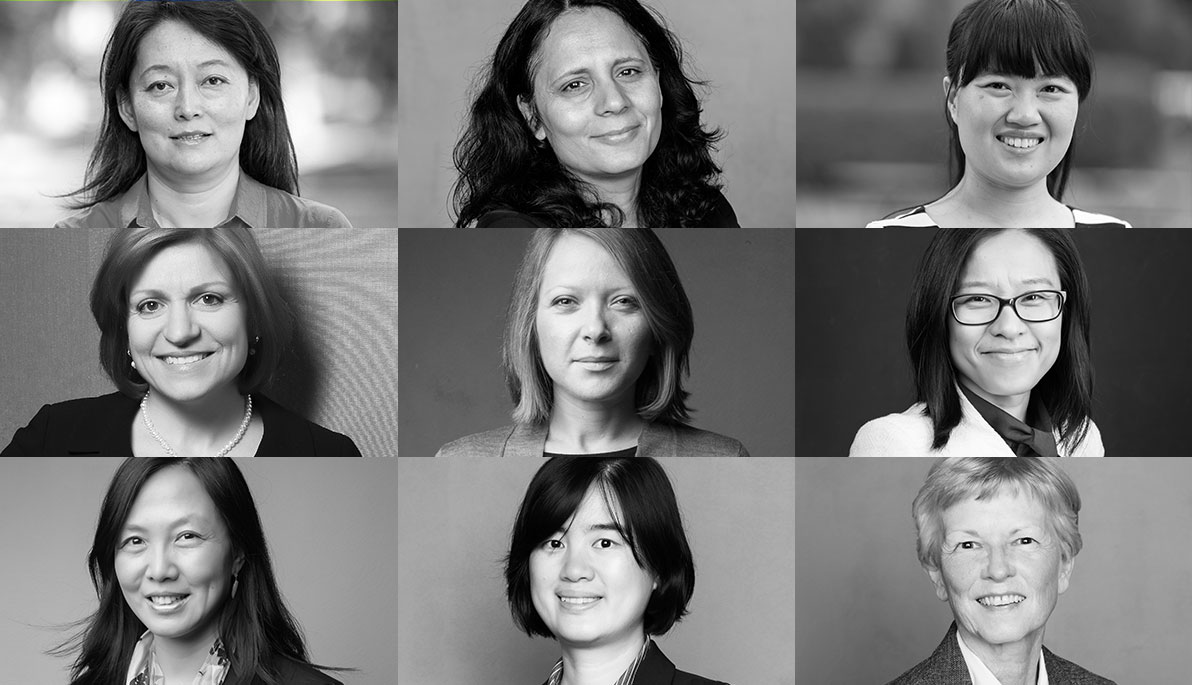News
Faculty Spotlight: The Women of NYIT School of Engineering and Computing Sciences
February 17, 2017
Photo: (Left to right, top to bottom) Tao Zhang, Ph.D., Sabiha Wadoo, Ph.D., Houwei Cao, Ph.D., Nada Anid, Ph.D., Dorinamaria Carka, Ph.D., Ziqian (Cecilia) Dong, Ph.D., Huanying (Helen) Gu, Ph.D., Fang Li, Ph.D., Sarah Meyland, J.D.
Encouraging women to pursue STEM-related fields is a priority for many institutes of higher learning. Through their research, work, and expertise, NYIT School of Engineering and Computing Sciences’ leadership and faculty members are setting an example for girls wishing to follow in their footsteps. Read about a few of them below:
Nada Anid, Ph.D., dean, along with co-editors Laurie Cantileno (B.S. ’85), Monique J. Morrow, and Rahilla Zafar, published The Internet of Women: Accelerating Culture Change. In the book, they examine the important role women play in traditionally male-dominated STEM fields, as well as what it will take to change the culture and close the gender gap. Anid focuses on academia and says that colleges like NYIT are taking the lead by increasing awareness about engineering and changing perceptions of how engineers should look, speak, and think.
Assistant Professor for Computer Science Houwei Cao, Ph.D. studies the intersection of core human attributes, like speech patterns and facial expressions, and computational analysis. From 2014 to 2015, she worked on a National Science Foundation (NSF) grant at Tufts University to research social robotics and Parkinson's disease. Her recent projects and areas of focus include affective computing, speech processing, natural language processing, and data science, and their applications in human-centric data analytics.
Dorinamaria Carka, Ph.D., assistant professor of mechanical engineering, thinks very small to get big results. She develops code to study smart, multifunctional materials that combine electric, magnetic, and mechanical properties on the nanoscale. Understanding the different ways these materials function is key when it comes to developing nanoengineered devices (or ultrasmall smart devices).
Ziqian (Cecilia) Dong, Ph.D., associate professor of electrical and computer engineering, will lead NYIT’s Research Experiences for Undergraduates (REU) program for the fifth consecutive summer. Dong secured funding from the NSF for the program, which focuses on mobile device security and wireless networks, through 2019. The program also provides students with research opportunities they may not have at their current institutions and welcomes participants from under-represented groups.
Medical terminologies leave most of us hopelessly lost, but expert Huanying (Helen) Gu, Ph.D., associate professor of computer science, finds ways to enhance their usefulness of terminologies. In her current study, supported by the National Institutes of Health (NIH), Gu is researching abstraction networks to facilitate the usability, comprehensibility, visualization, and quality assurance of terminologies in the medical field.
Fang Li, Ph.D., assistant professor of mechanical engineering, has a way with sensors. Her research includes using cell-based biosensors to detect water toxicity, creating a device that harvests energy in wireless body area networks, and developing acoustic wave sensors for use in harsh environments. She also concluded a study, funded by the Department of Energy, on a self-powered, wireless sensor system for remotely monitoring the internal conditions of nuclear waste casks.
Sarah Meyland, J.D., associate professor of environmental technology and sustainability, wants our water clean. The specialist in groundwater protection, water resources management, and environmental law researches innovative solutions, such as constructed wetlands, which mimic the functionality of natural ecosystems, but are flexible enough to work in urban areas. Meyland presented at NYIT’s 2015 Sustainable Megacities conference in Beijing.
Associate Professor of Electrical and Computer Engineering Sabiha Wadoo, Ph.D., specializes in the areas of feedback control of nonlinear control systems, intelligent transportation systems, and robotics. That means she looks at everything from predicting traffic patterns using wireless cellular networks to figuring out how to establish a cost effective control and robotics program by using LEGOs to study delay-based wireless feedback control. In addition to authoring numerous publications, Wadoo is the associate editor for the journal IEEE transactions on Intelligent Transportation Systems.
Tao Zhang, Ph.D., associate professor of computer science, is hard wired for wireless research. Her area of interests include wireless communication and networking, cloud computing, WDM optical networks, and network security. Zhang is the principal investigator of two NSF-funded projects: “MRI: Acquisition of a DC/RF Sputtering System to Support Multidisciplinary Research on Medical Sensors and Micro-generators in WBAN” and “Enhancing the Electrical and Computer Engineering Curriculum by Integrating Applications of Wireless Technology.”

By Julie Godsoe




